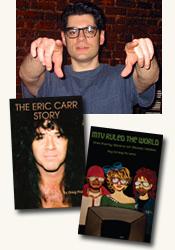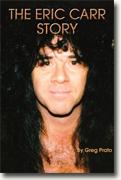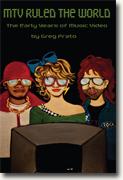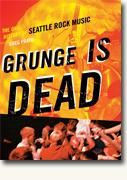author interview
book reviews:
· general fiction
· chick lit/romance
· sci-fi/fantasy
· graphic novels
· nonfiction
· audio books
· author interviews
· children's books @
curledupkids.com
· DVD reviews @
curledupdvd.com
newsletter
win books
buy online
links
home
for authors
& publishiss
for reviewers

|
|||||

Steven Rosen talks with author Greg Prato about his writing, his new books and old books, and what it takes to be an author. Interviewer Steven Rosen: How do you go about writing a book? Where do you start? Greg Prato: So far, I have been lucky to do books on subjects that were entirely of my choosing. So I knew quite a lot about each subject, and my prior interest/knowledge of each has resulted in books that I am very proud of. Regarding how I start a project, it varies. If it's about a deceased musician (in the case of Tommy Bolin and Eric Carr), I got in touch with an immediate family member, who gave me the OK to proceed. In the case of Blind Melon, I'm friendly with a few of the surviving members, so it wasn't hard to get in touch w/ them and get permission. From there, the long and winding interview process starts... Where do you find your research? Online? Other books? As I mentioned before, all the books I've done thus far have been on subjects that I knew a lot about beforehand, so a lot of research was done by all the facts I had stored in my brain! But really, the best kind of research is to interview people directly. You can do all the research you want, but you don't know what's fact or fiction until you interview someone who was directly involved in the life of the person you're writing about. If there has been other books written on a subject that I'm doing a book about (grunge, MTV, etc.), I actually purposely try NOT to read any previous books written by other authors on the same subject, so that my book will hopefully turn out not repeating the same old stuff. But online resources definitely helped both my Tommy Bolin and Shannon Hoon/Blind Melon books, as I was able to get quotes from both Bolin and Hoon (who are both deceased, and both of whom I never had the opportunity to interview) from old magazine articles that I was able to use in my books. Do you like engaging in the interview process? How do you prepare for an interview? I love doing interviews - it seems like that's what I spend half my life doing! Again, since I'm a fan already of the subjects of my books, it's such a cool thing to be able to be able to speak to the people that are real "characters" in the actual story. As far as preparation, it varies. Early in the interview process for a book, I usually have a set of questions on paper. As the interview process gets further along, I have the questions memorized by that point, and don't even have to look at the paper. Also, each person is different and relates to the story at different parts, so it doesn't make sense to ask everyone the same exact set of questions. So you add and adjust questions to fit the person you're interviewing. How much rewriting do you do for your books? Since I've worked almost entirely in the "oral history" format for all my books (except for the book No Schlock...Just Rock!, which was a compilation of most of my magazine articles from 2003-2008), there is not a lot of rewriting to be done. It's important to keep the quotes as close as possible to what the person said in the interview, so that's what I focus the most on when putting together a book. That said, I'm currently working with renowned rock drummer Carmine Appice on his autobiography, and he and I are going through the manuscript and rewriting/improving parts, since the book will be in a traditional set-up (not an oral history). How do you choose the subjects of your books? Simple - if it's a subject that I've always wanted to read a book about, and I feel there hasn't already been a book written that truly does the subject in question justice, then I take the plunge. What intrigued you about Shannon Hoon? Tommy Bolin? Both Shannon Hoon and Tommy Bolin I've always felt were amongst the most underrated figures of rock music. I've seen countless concerts over the years, and the shows I saw with Shannon Hoon fronting Blind Melon remain some of the best ones I've ever seen. Shannon had an uncanny way of breaking down the "barrier" between performer and audience (that I've rarely seen in other rock singers). And the last studio album he did with Blind Melon, Soup, remains one of my favorite all-time albums - despite it not selling well (or being critically acclaimed) when it was first released in 1995. A lot of questions remained around Shannon's death, and I was always interested in reading about his life, the stories behind the songs, the album sessions, etc. And the same with Tommy Bolin. Whenever there is a "greatest rock guitarist" list in a magazine or TV show, it drives me crazy that Tommy is never included. He played on quite a few great - yet VERY underrated - rock albums of the 1970s (either as a solo artist, a member of popular rock bands, or as a session musician). And the thing about Tommy is he could play just about any musical style you put in front of him - and be able to master it (listen to his incredibly musically varied 1975 solo album, Teaser, for the proof). Again, a lot of questions surrounded Tommy's death in 1976, that as a fan, I was always curious to find out what really happened. When you wrote Grunge Is Dead: The Oral History of Seattle Rock Music, who were some of the more interesting characters you interviewed? Blag Dahlia from the Dwarves was a very interesting interview, as he held nothing back and told great story after great story. The same with Mark Arm from Mudhoney/Green River - he was very honest about his experiences back in the day. And of course, Eddie Vedder was a great interview, again, because he had lots of great stories - specifically about the early days of Pearl Jam (that I have never read anywhere before). Another good interview was Layne Staley's mother, Nancy McCallum, as she was willing to discuss her son's final years, which is an era of his life that there was not that much info about until Grunge is Dead came out. What were some of the more shocking things you learned about the grunge scene? The stories of Layne Staley's last few years were a bit disturbing. I was surprised when Blag Dahlia said that he always saw a lot of similarities between Nirvana and Guns N' Roses...until he started listing some similarities that I couldn't deny. With your new book, MTV Ruled the World: The Early Years of Music Video, did your idea about what MTV was change after you did the book? I had a pretty good idea of what MTV was going into it, but I certainly learned a lot about what was going on behind the scenes during the channel's formative years by doing this book. Very interesting stuff indeed - especially the parts about when it first got off the ground, its initial success, the story behind MTV famous theme song, the creation of the "I Want My MTV" slogan, etc. It was also interesting to get the stories behind some of the biggest videos of music history, particularly Michael Jackson's "Billie Jean" and "Beat It" clips, for which I interviewed each of the videos' directors (Steve Barron and Bob Giraldi). And also, the politics surrounding getting those videos played on MTV. Many artists will tell you MTV ruined the music industry – what are your feelings? It's difficult to say, but to a certain degree, I'd say yes. When MTV first went on the air, it was more open to playing a variety of different styles. It appeared that all an artist (no matter how big or small they were) had to do was submit a video, and there was a chance it would get played. But as the channel got more popular, it became more about $, and whenever it becomes about $, playlists get regimented, things get categorized, and soon, what was once an almost freeform playlist gets very structured and predictable. So you could say I was big fan of MTV early on, not so much as the decade wore on. What did you learn about Kiss from writing the Eric Carr book? Quite a bit, as I tried to get a good amount of info that has not been already reported in the multitude of Kiss books that have flooded the marketplace since the original line-up reunited in 1996. While The Eric Carr Story is a book that obviously focuses on Eric and tells his life story, it also doubles as a book about non-make-up/'80s era Kiss (an era which is usually skipped over or barely talked about in a lot of the Kiss books that have been released). But some of the tidbits I learned included when I interviewed renowned producer Bob Ezrin, he finally went on record with just what the heck the storyline to Kiss's whacked-out concept album, (Music From) The Elder, was all about. And as a fan, I've always heard conflicting stories about Eric's last year, about if he was still a member of Kiss, was he out of Kiss, what his relations with the band were at that time, etc., and it's discussed in detail in the book. You oftentimes adopt an oral narrative approach to your books – why? Even before I became a writer, whenever I would read magazines like Rolling Stone and Spin, I always liked straight Q&A "interviews" rather than articles with narratives. Then in the late '90s, I happened to stumble upon the book Please Kill Me: The Uncensored Oral History of Punk by Legs McNeil and Gillian McCain, and I was introduced to the "oral history" format (which is basically a subject, followed by a bunch of quotes from interviewees on that subject). By doing so, you're cutting out any needless narrative from the author, and you're getting the story straight from the mouth of someone that was actually "on the scene." What I also dig about "oral histories" is that it gives you feeling of a documentary...but in book form. What other music journalists do you admire? A lot of my favorite music journalists are from the 1970s. The entire Creem Magazine writing staff I thought was AMAZING (their use of humor and wise ass-isms was second to none - and sadly, this refreshing approach seems to be completely forgotten in the rock journalism of today). Lester Bangs was really great, as is Cameron Crowe. As for modern day writers, Legs McNeil is probably my favorite (Please Kill Me is my favorite rock book of all time), and I also dig the review writing of Stephen Thomas Erlewine at All Music Guide. What has been your most difficult book to write? Probably Grunge is Dead, just because I interviewed so many people (over 100), so fitting it together as a cohesive story was a bit of a challenge. But I'm very happy with the end result, as are many of the people who have read it (check out the positive feedback on www.amazon.com With the Internet so pervasive, do people still read real books? Yes they do. I still enjoy reading a good, well-written, thought-provoking book, and I'm sure there are many other people who share this with me. The beauty of the internet is that anyone can post anything at any time. But that said, there has to be style and substance to your work, so just because information is posted about a subject on the internet doesn't mean that it's been worked into a cohesive and easy-to-read story. What does it feel like when you’ve completed a book? It certainly is satisfying when you've completed work on a book. But probably even better is when you get positive feedback from readers via email or feedback on bookstore websites, that tell you how much they dug the book. It makes you feel that all the hard work you put into the project was well worth it, and also, that there are indeed others out there that share your same interests.
|
|||||
| fictionnsf/f · comic books · nonfiction · audio newsletter · free book contest · buy books online review index · links · · authors & publishiss reviewerss |
|
| site by ELBO Computing Resources, Inc. | |




